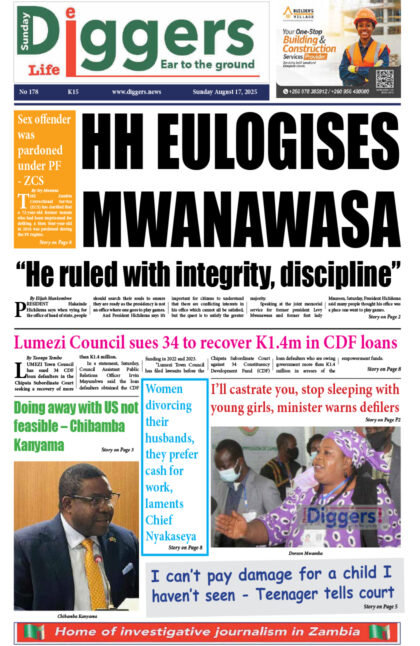Former Secretary to the Cabinet Dr Sketchley Sacika says UPND leader Hakainde Hichilema’s complaints against Chinese influence in Zambia implies he is patriotic towards the country rather than inciting xenophobic attacks.
And Sacika says Foreign Affairs Minister Joe Malanji acted against the Republican Constitution by instructing Chongwe District Council to give land to Chinese nationals as a burial site and that the local authority should, therefore, not comply.
In an interview with News Diggers! in Lusaka, Dr. Sacika argued that it was not sabotage to speak against foreign influence in the local economy.
He charged that there was something wrong with Hichilema’s critics for accusing him of inciting the riots that rocked Kitwe last week Monday.
“In 1964, we stood on the threshold of Independence and of being masters of our own destiny. But we are now throwing everything away! In 1969, we paid the owners of our mines large sums of money in order to acquire the mines for ourselves. But 30 years later, the MMD government gave away the mines to foreigners eventually for nothing. Zambians don’t know how much money the MMD government collected as a result of the privatisation of those mines. Apart from giving away our mines, the MMD government also returned the economy to foreigners. In 1969, apart from acquiring the mines for ourselves, we had also embarked on a programme to put the economy of Zambia under the control of Zambians themselves. But since the MMD days, we have lost the focus. Now, it is not xenophobia to complain about the Chinese taking over the economy of our country,” Dr Sacika explained.
“In fact, it is patriotism. What HH is doing is patriotism. Speaking for the country is patriotism. I don’t think the Chinese would allow the Americans to go to China to exert the kind of influence the Chinese are exerting on our economy. It is a misconception bordering on naivety to think that the Chinese are here for philanthropic exercises. The Chinese are not here for charity, they are here for business and to harvest as much profit as they can from their labour and Zambians must understand.”
He said government should ensure that it does not outsource the management of the economy to the Chinese, saying doing so would negate the struggle for independence.
“Zambians cannot afford to outsource the management of the economy to foreign interest, including the Chinese. Such an arrangement would completely negate our struggle for independence and reduce us to a nation of wage earners and not masters of our own destinies. Now, those of us who fought for independence feel greatly aggrieved to see what is happening to our country. Zambians must find out because this is important. Zambians must find out why they are failing to manage their own affairs and why they are now prepared to give their economic assets away to foreigners, including the Chinese,” he added.
“We built TAZARA and we are failing to run that company. Now, when you complain about your national assets being taken away or being given away to foreigners, that is not sabotage; that is patriotism. You know, if we had not been patriotic, we would not have chased the British out of our country! The British would still be here, still managing our mines. So, you cannot be accused of being unpatriotic, otherwise then there is something just not right with the one accusing you.”
And Dr Sacika added that Malanji acted against the Constitution by instructing Chongwe District Council to give land to Chinese nationals as a burial site.
“Minister Malanji’s instruction to the Chongwe Council over the land allocated to the Chinese for their cemetery is unconstitutional, null and void. Therefore, the Council has no obligation to comply with the instruction. According to Article 152 of the Constitution of Zambia, the administration of the district is the responsibility of the local authority. Only the local authority is constitutionally-empowered to oversee the programmes and projects. To this effect, Article 152 of the Constitution specifically states that the national government and provincial administration shall not interfere with or compromise the local authority’s ability or right to perform its functions. What this means is that no minister, no official employed in the central government, may overrule or give instructions to the local authority in respect of the discharge of its functions,” said Dr. Sacika.
“In order to ensure orderly management of public affairs, it is the duty of permanent secretaries to guide their ministers on the operations of the law. The system of government depends on observing the law and the regulations without which only chaos would prevail.”























